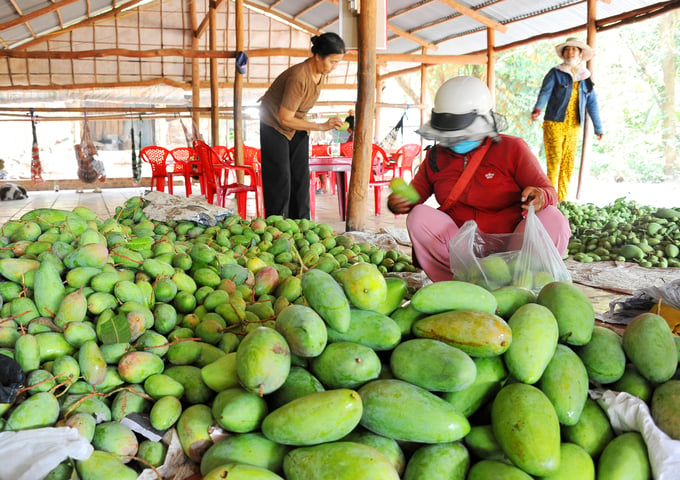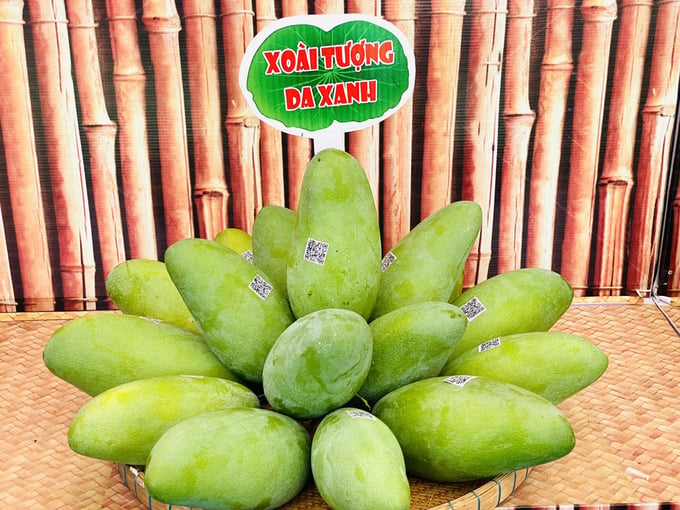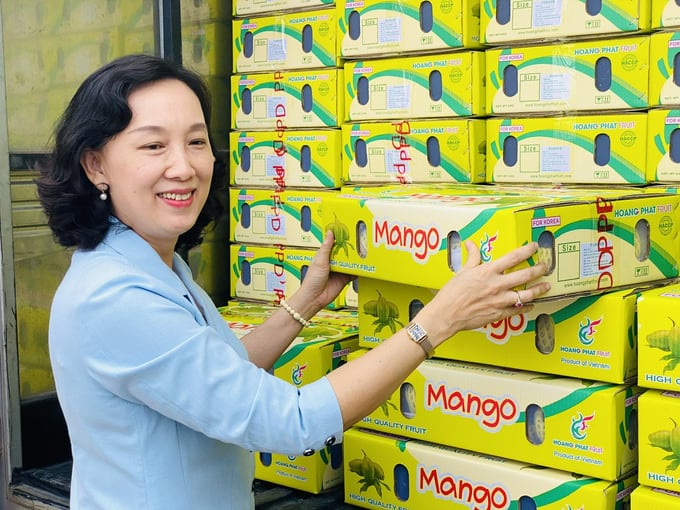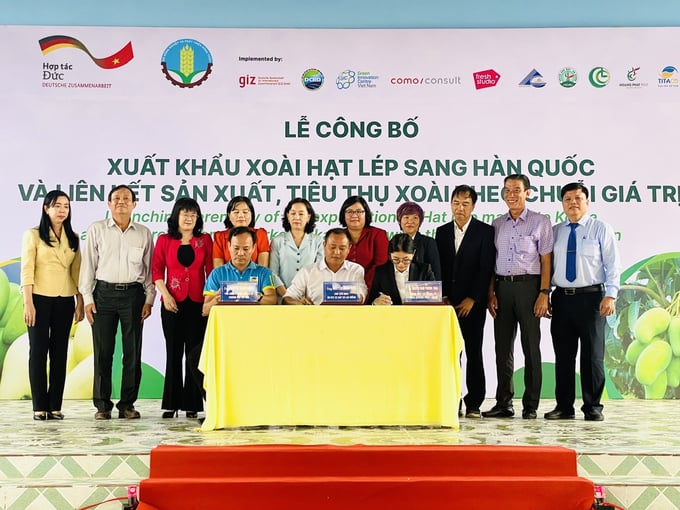June 21, 2025 | 01:59 GMT +7
June 21, 2025 | 01:59 GMT +7
Hotline: 0913.378.918
June 21, 2025 | 01:59 GMT +7
Hotline: 0913.378.918

The current total mango production area in An Giang province is estimated at 12,600 hectares, with a yield of over 225 thousand tons per year. Notably, Cho Moi district houses the largest mango production area in the province at 6,400 hectares. Photo: Le Hoang Vu.
The Cho Moi District People's Committee, in collaboration with the An Giang province's agricultural sector, announced two export shipments totaling 20 tons of mangoes in early 2024. Accordingly, the district exported 13 tons of flat-seed mango to South Korea on December 19, and 7 tons of green-skinned mangoes to Australia and the United States on January 5.
This event marks the district's initial steps towards developing the cooperative production and consumption of mangoes along the value chain. Most notably, the value chain will focus on exporting to competitive markets through the signing of consumption contracts.
According to the An Giang Provincial People's Committee, the province has issued numerous action programs, projects, and plans for agricultural development, farmers, rural areas, climate change adaptation, and market trends. These efforts aim to increase farmers' income, including the plan for "Crop restructuring from inefficient rice production to vegetables, fruits, and trees from 2021 to 2025" and the implementation of digital transformation in agricultural production.
Ms. Nguyen Thi Minh Thuy, Vice Chairman of the An Giang Provincial People's Committee, regarded mango trees as the leading economic crop with high value. Accordingly, the province has focused on transitioning to mango production, thereby positively impacting the province's agricultural growth. The local mango production area is currently estimated at 12,600 hectares, with an annual yield of over 225 thousand tons. Cho Moi district has the largest mango production area in the province at 6,400 hectares, representing over 50% of the province's total mango production area. Mangoes are primarily produced in the communes of Tan My, My Hiep, and Binh Phuoc Xuan.
With the aim of meeting export standards, many mango farms and cooperatives have increased their application of scientific and technical advancements in production. To date, Cho Moi district has at least 704 hectares of VietGAP-compliant mango production area, with 41 production unit codes covering nearly 6,200 hectares. The district's mangoes are exported to various markets around the world including China, the United States, South Korea, Japan, and Australia. Additionally, the cooperative production and consumption of mangoes along the value chain has been one of the province's top priorities in promoting and adding value to local products in recent years.

Within the first two months of 2023, the Cho Moi District People's Committee, in collaboration with the An Giang province's agricultural sector, announced two export shipments totaling 20 tons of mangoes to the United States, Australia, and South Korea. Photo: Le Hoang Vu.
Mr. Nguyen Minh Hien, Director of the Cu Lao Gieng GAP Cooperative in Cho Moi district, announced that the cooperative recently exported 20 tons of mangoes to various markets worldwide. He attributed this success to the leadership and guidance from the provincial authorities, the active involvement of the local community, and the collective economic mindset shift among its people, which has contributed to positive transformations in agricultural production.
The GIC project has been consistently providing technical guidance on safe and VietGAP-compliant mango production, transferring post-harvest mango processing technologies, and producing high-quality mango products such as dried mangoes and mango rice paper, thereby ensuring a stable supply for both export and domestic markets.
Regarding cooperative production, the Cu Lao Gieng GAP Cooperative has signed agreements with over 100 official members, and established partnerships with input material suppliers and market outlets. Consequently, the cooperative has established a production chain on over 243 hectares, with an annual mango yield of over 1,700 tons.
Furthermore, the cooperative has signed contracts to supply fresh mangoes for export to OCFAMRM Company, Hoang Phat Fruit Company Limited, Chanh Thu Fruit Import-Export Company Limited, and T&T Group.

According to Ms. Nguyen Thi Minh Thuy, Vice Chairman of An Giang Provincial People's Committee, strict compliance with the requirements imposed by importing countries regarding pesticide residue levels, harmful insects, traceability, and irradiation is crucial to export local mangoes to demanding markets such as the United States, Australia, South Korea, and conquer other challenging markets worldwide. Photo: Le Hoang Vu.
Mr. Cu Minh Trong, Chairman of the Cho Moi district People's Committee expressed his delight at Cho Moi's status as the district with the largest mango production area in An Giang province. He also emphasized the positive support from the province's agricultural, and science and technology sectors in establishing irrigation systems for mango production development, organizing training sessions, information dissemination campaigns, and encouraging farmers to adopt safe, VietGAP-compliant production practices. Additionally, support for the issuance of production codes have been implemented to meet the strict requirements of various international markets.
Many cooperatives in the district have partnered with numerous local and foreign business since 2021 to export over 293 tons of VietGAP-compliant green-skinned mangoes and flat-seed mangoes to the United States and South Korea, among others. However, despite these efforts, the total export output is unable to correspond with the district's annual mango yield.
With over twelve years of experience in exporting fresh fruits to demanding markets such as South Korea, Japan, Australia, and the United States, Ms. Nguyen Nam Phuong Thao, Director of Business at Hoang Phat Fruit Company Limited, emphasized the need to develop and expand the company's scale of operations, with the target of reaching an increase of 10 to 20% in export volume in 2024.

Cu Lao Gieng GAP Cooperative signing contracts to supply fresh mangoes for export to OCFAMRM Company, Hoang Phat Fruit Company Limited, Chanh Thu Fruit Import-Export Company Limited, and T&T Group. Photo: Le Hoang Vu.
"To boost production, consumption, and export, and to create high-quality products that meet the demand from South Korea, it is essential to maintain and enhance the quality and stability of raw materials, increase production volume to enhance the value of both An Giang and Vietnamese mangoes. Furthermore, local governments should enable businesses to expand their raw material areas and establish production unit codes for the convenience of export-oriented businesses," Ms. Thao voiced her expectations.
Additionally, Ms. Nguyen Thi Minh Thuy added that strict compliance with the requirements imposed by importing countries regarding pesticide residue levels, harmful insects, traceability, and irradiation is crucial to export local mangoes to demanding markets such as the United States, Australia, South Korea, and conquer other challenging markets worldwide.
This achievement is the result of significant efforts from local Party committees, government agencies, businesses, as well as the cooperatives and farmers in Cho Moi district. Moreover, it is the culmination of a challenging ten-year negotiation endeavor.
With the aim of developing high-quality mango production areas and establish a sustainable supply chain to meet the demand for high-quality mango exports in the future, the An Giang Provincial People's Committee requests provincial departments, agencies, and Cho Moi district to encourage farmers to participate in collective economic activities, and adopt scientific and technological advancements in production.
Efforts will be made to enhance the participation of businesses in mango production and consumption partnerships within the district. Additionally, support will be provided to promote mango products on e-commerce platforms. Farmers, cooperative members, and collaborative groups must strengthen production connections, and adopt advanced scientific and technological advancements in production, including innovating production processes which comply with VietGAP and GlobalGAP standards.
Furthermore, the An Giang Provincial People's Committee will support businesses and farmers in establishing stable mango raw material areas, and promoting the sustainable development of the mango value chain.
Translated by Nguyen Hai Long
![Turning wind and rain into action: [9] Digitizing hydrometeorological data in response to climate change](https://t.ex-cdn.com/nongnghiepmoitruong.vn/608w/files/news/2025/06/17/z6704423696987_15fd32ffc26d590d204d520c9dac6786-nongnghiep-165943.jpg)
(VAN) Farmers have begun accessing hydrometeorological applications to adjust their cropping schedules, aiming to ensure productivity and adapt to climate change.
![Turning wind and rain into action: [8] Real-time salinity detection and early warning technology](https://t.ex-cdn.com/nongnghiepmoitruong.vn/608w/files/news/2025/06/17/z6704423696987_15fd32ffc26d590d204d520c9dac6786-nongnghiep-151127.jpg)
(VAN) Thanks to the integration of modern hydrological-hydraulic models, remote sensing technologies, and artificial intelligence, the accuracy of hydrological forecasting has significantly improved.
![Turning wind and rain into action: [7] Early disaster warnings help marine farmers minimize losses](https://t.ex-cdn.com/nongnghiepmoitruong.vn/608w/files/news/2025/06/17/z6704423696987_15fd32ffc26d590d204d520c9dac6786-nongnghiep-142942.jpg)
(VAN) In recent years, thanks to early disaster warnings and forecasting, marine farmers in Khanh Hoa province have been able to reduce risks and losses, thereby improving production efficiency.
![Turning wind and rain into action: [6] ‘Four on-the-spot’ disaster management software](https://t.ex-cdn.com/nongnghiepmoitruong.vn/608w/files/news/2025/06/17/e5a48259d6a262fc3bb3-nongnghiep-183800.jpg)
(VAN) By simply activating the scenario on the disaster management software, the relevant authorities immediately know how many households need to be evacuated, where to evacuate them to, and by what means of transportation…
![Turning wind and rain into action: [5] Hue applies modern technology in disaster forecasting](https://t.ex-cdn.com/nongnghiepmoitruong.vn/608w/files/news/2025/06/17/z6704423696987_15fd32ffc26d590d204d520c9dac6786-nongnghiep-093938.jpg)
(VAN) In Hue city, modern technology has recently been applied in meteorological and hydrological forecasting and warning, helping to reduce the damage caused by natural disasters.

(VAN) A cutting-edge farming technique being implemented on an experimental ranch in Arizona's Sonoran Desert has already saved a billion gallons of water over five years, according to Civil Eats.

(VAN) Poultry and pig production and the environment can be boosted through enhanced water technology, according to new research.